|
|
 |
 |
 |
 |
 |
 |
|
|
What part did Jane Fonda Play? |
 |
 |
 |
 |
|
|
|
Vietnam War - What part did Jane Fonda Play?
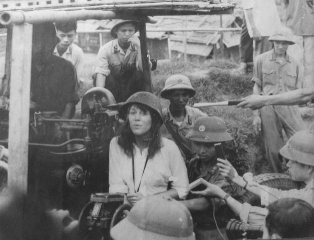
Jane Fonda sitting on a seat of an anti-aircraft gun
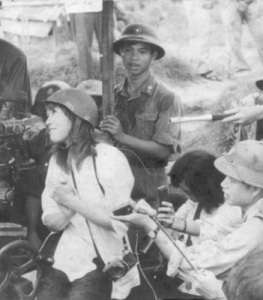
Jane Fonda looking admiringly at an NVA gun crew
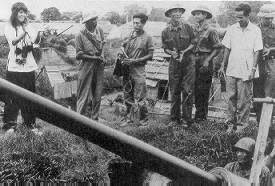
Jane Fonda applauding an NVA anti-aircraft gun crew. These guns were used to shoot down American planes and contributed to the deaths of American Airmen.
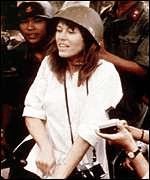
Color photo of Jane Fonda sitting in the gun seat
Several requests from students and other visitors have asked if the photos depicting Jane Fonda sitting on an NVA anti-aircraft gun were really her or not. The answer to this question is YES. Jane Fonda has expressed her regrets for having her picture taken while sitting on the anti-aircraft gun and for the pain that her action has caused many American Veterans.
Another student had requested the transcript of Jane Fonda's radio address which she had broadcast in North Vietnam. This transcription, dated August 22, 1972 was made from her Hotel Especen broadcast in Hanoi at 7:11 p.m.
The following was submitted in the U.S. Congress House Committee on Internal Security, Travel to Hostile Areas. [HR16742, 19-25 September 1972, page 761]
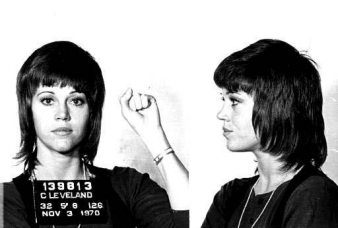
[Broadcast]
This is Jane Fonda. During my two week visit in the Democratic Republic of Vietnam, I've had the opportunity to visit a great many places and speak to a large number of people from all walks of life- workers, peasants, students, artists and dancers, historians, journalists, film actresses, soldiers, militia girls, members of the women's union, writers.
I visited the (Dam Xuac) agricultural coop, where the silk worms are also raised and thread is made. I visited a textile factory, a kindergarten in Hanoi. The beautiful Temple of Literature was where I saw traditional dances and heard songs of resistance. I also saw unforgettable ballet about the guerrillas training bees in the south to attack enemy soldiers. The bees were danced by women, and they did their job well.
In the shadow of the Temple of Literature I saw Vietnamese actors and actresses perform the second act of Arthur Miller's play All My Sons, and this was very moving to me- the fact that artists here are translating and performing American plays while US imperialists are bombing their country.
I cherish the memory of the blushing militia girls on the roof of their factory, encouraging one of their sisters as she sang a song praising the blue sky of Vietnam- these women, who are so gentle and poetic, whose voices are so beautiful, but who, when American planes are bombing their city, become such good fighters.
I cherish the way a farmer evacuated from Hanoi, without hesitation, offered me, an American, their best individual bomb shelter while US bombs fell near by. The daughter and I, in fact, shared the shelter wrapped in each others arms, cheek against cheek. It was on the road back from Nam Dinh, where I had witnessed the systematic destruction of civilian targets- schools, hospitals, pagodas, the factories, houses, and the dike system.
As I left the United States two weeks ago, Nixon was again telling the American people that he was winding down the war, but in the rubble- strewn streets of Nam Dinh, his words echoed with sinister (words indistinct) of a true killer. And like the young Vietnamese woman I held in my arms clinging to me tightly- and I pressed my cheek against hers- I thought, this is a war against Vietnam perhaps, but the tragedy is America's.
One thing that I have learned beyond a shadow of a doubt since I've been in this country is that Nixon will never be able to break the spirit of these people; he'll never be able to turn Vietnam, north and south, into a neo- colony of the United States by bombing, by invading, by attacking in any way. One has only to go into the countryside and listen to the peasants describe the lives they led before the revolution to understand why every bomb that is dropped only strengthens their determination to resist. I've spoken to many peasants who talked about the days when their parents had to sell themselves to landlords as virtually slaves, when there were very few schools and much illiteracy, inadequate medical care, when they were not masters of their own lives.
But now, despite the bombs, despite the crimes being created- being committed against them by Richard Nixon, these people own their own land, build their own schools- the children learning, literacy- illiteracy is being wiped out, there is no more prostitution as there was during the time when this was a French colony. In other words, the people have taken power into their own hands, and they are controlling their own lives.
And after 4,000 years of struggling against nature and foreign invaders- and the last 25 years, prior to the revolution, of struggling against French colonialism- I don't think that the people of Vietnam are about to compromise in any way, shape or form about the freedom and independence of their country, and I think Richard Nixon would do well to read Vietnamese history, particularly their poetry, and particularly the poetry written by Ho Chi Minh.
[recording ends]
Background of Jane Fonda's Anti-War Activities
While American Soldiers were fighting and dying in the Vietnam War, Jane Fonda, the daughter of Henry Fonda, was using her money and influence at colleges and universities to gather support to advocate communism and encourage rebellion and anarchy against the United States Government.
On November 21, 1970 she told a University of Michigan audience of some two thousand students, "If you understood what communism was, you would hope, you would pray on your knees that we would some day become communist." At Duke University in North Carolina she repeated what she had said in Michigan, adding "I, a socialist, think that we should strive toward a socialist society, all the way to communism. " Washington Times July 7, 2000
Jane Fonda began her participation in anti-war activities around 1967, allegedly after meeting with Communists while in France and with American citizens who were revolutionaries. Her activities included active participation in demonstrations, rallies, radio broadcasts and plays.
Jane Fonda also helped in the organization of a production group called the F.T.A. (F*** The Army). This group helped to set up coffee houses near military bases where they would perform anti-war derogatory-type sketches for the visiting soldiers. The coffee-house sketches were intended to counterpoint the U.S.O. shows, such as Bob Hope and other U.S.O. sponsored performers whose performances increased morale and gave positive support to American soldiers. Some of the F.T.A. coffee house employees would mingle with the soldiers to help them to "relax and unwind", while encouraging the soldiers to desert. Some soldiers alleged that they were promised jobs and money by the F.T.A. if they deserted.
The Vietnam Veterans Against the War Organization received major financial support from Jane Fonda. Jane Fonda's F.T.A. coffee houses helped in recruiting soldiers and veterans for the Vietnam Veterans Against The War Organization. The Vietnam Veterans Against the War Organization membership was approximately 7,000 at it's highest. The Organization's membership number was comparatively low, when you consider that more than 2 1/2 million Americans served during the Vietnam War.
Jane Fonda personally sought out returning American soldiers from Vietnam to solicit them to publicly speak out against American atrocities against Vietnamese women and children during her broadcasts. North Vietnamese officials based in Canada allegedly coordinated her broadcasts.
In 1972 Jane Fonda, Tom Hayden and others traveled to North Vietnam to give their support to the North Vietnamese's Government. When she returned to the United States, she advised the news media that all of the American Prisoners of War were being well treated and were not being tortured.
As the American POWs returned home in 1973, they spoke out about the inhumane treatment and torture they had suffered as prisoners of war. Their stories directly contradicted Jane Fonda's earlier statements of 1972. Some of the American POWs such as Senator John McCain , a former Presidential candidate, stated that he was tortured by his guards for refusing to meet with Jane Fonda and her group. Jane Fonda, in her response to these new allegations, referred to the returning POWs as being "hypocrites and liars."
The Wall Street Journal (August 3, 1995) published an interview with Bui Tin who served on the General Staff of the North Vietnam Army and received the unconditional surrender of South Vietnam on April 30, 1975. During the interview Mr. Tin was asked if the American antiwar movement was important to Hanoi's victory. Mr. Tin responded "It was essential to our strategy" referring to the war being fought on two fronts, the Vietnam battlefield and back home in America through the antiwar movement on college campuses and in the city streets. He further stated the North Vietnamese leadership listened to the American evening news broadcasts "to follow the growth of the American antiwar movement."
Visits to Hanoi made by persons such as Jane Fonda, former Attorney General Ramsey Clark and various church ministers "gave us confidence that we should hold on in the face of battlefield reverses." Mr. Tin surmised that "America lost because of its democracy; through dissent and protest it lost the ability to mobilize a will to win." Mr. Tin further advised that General Vo Nguyen Giap (Commanding General of the North Vietnam Army) said the 1968 Tet Offensive was a defeat.
The military defeat of North Vietnam after the Tet Offensive of 1968 became a political victory for North Vietnam because of anti-war demonstrations and the sensationalism of the news media. The North Vietnamese interpreted the U.S. reaction to these events as the weakening of America's resolve to win the war. The North Vietnamese believed that victory could be theirs, if they stayed their course.
From 1969 until the end of the war, over 20,000 American soldiers lost their lives in a war that the United States did not have the resolve to win. The sensationalism by the American news media and the anti-war protests following the 1968 Tet Offensive gave hope to Communist North Vietnam, strengthening their belief that their will to succeed was greater than ours. Instead of seeking a successful resolution at the Paris Peace Conference following the disastrous defeat of the 1968 Tet Offensive, they employed delay tactics as another tool to inflame U.S. politics. This delaying tactic spurned further anti-war demonstrations. Those who sensationalized their reporting of the war and those who supported anti-war demonstrations are guilty of giving our enemy hope. Because of their actions, they must share partial responsibility for those 20,000 + Americans deaths.
We won the war on the battlefield but lost it back home on the college campuses and in the city streets.
must realize that there are agents* operating in this Country attempting to undermine our Country and it's leadership through our democratic principles in an effort to achieve a foreign country's goal. A prime example of such a person during the Vietnam War was Jane Fonda, an admitted Socialist, who blatantly supported North Vietnam. * Agent - Any person who works to obtain the goals of another nation either for money or for their own political beliefs.
A valuable lesson was taught by North Vietnam to other nations on how the United States may be defeated by fighting a two front war - the battlefield and the American home front. We must be aware of this vulnerability.
In 1975, after the fall of the South Vietnam Government, Jane Fonda returned to Hanoi with her newborn son Troy for a celebration in her honor for the work she had done for North Vietnam. During the celebration, her son was christened after a Viet Cong hero, Nguyen Van Troi. Troi had attempted to assassinate Secretary of Defense Robert McNamara while on his visit to South Vietnam in 1963. The South Vietnam Government executed Troi for this attempted assassination.
I have heard and read that some people believe that Jane Fonda was simply young and impressionable. Jane Fonda was born on December 21, 1937. She was 34 years old when she made her infamous trip to North Vietnam and was in her 30's when she participated in anti-war demonstrations and rallies. During this same time period a large number of young American soldiers, who had not yet reached their 21st birthday, were fighting the war in Vietnam and were held accountable for all of their actions. These same young soldiers were, upon their return to the United States, still not of legal age to vote or buy alcoholic beverages. Jane Fonda was an adult when she made these conscious decisions and actions, and as such, she is responsible and should be held accountable. The Vietnam Memorial Wall contains the names of 25,493 American soldiers who served their Country and paid the ultimate price for freedom who were under the age of 21 (Casualty Statistics ).
Many Veterans would have enjoyed seeing the following mug shot of Jane Fonda taken for her treasonous acts, instead of the bogus drug charge which was later dropped.

John Kerry with Jane Fonda
http://www.1stcavmedic.com/jane_fonda.htm
|
|
|
|
|
|
 Vietnam War History
Vietnam War History
